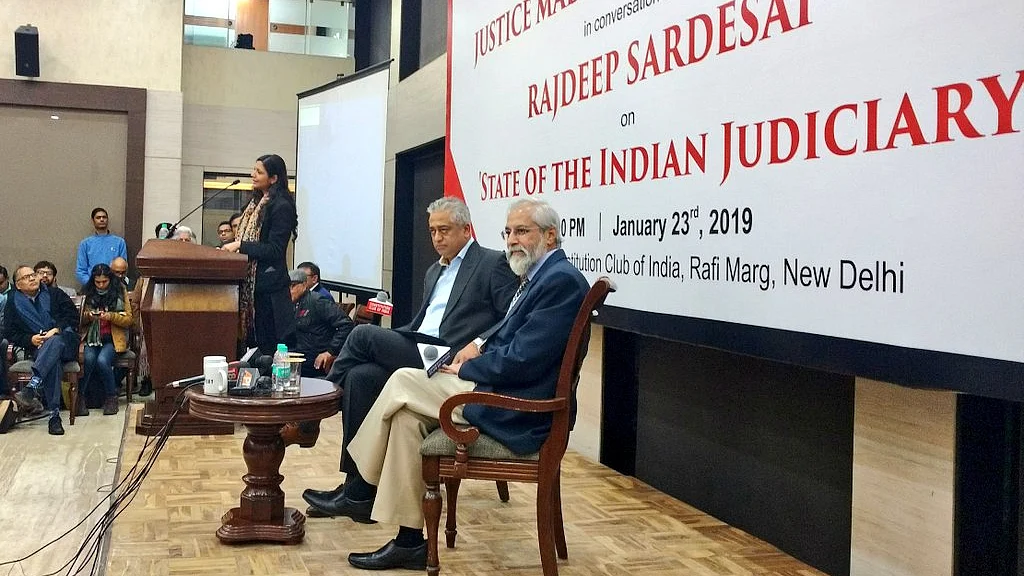‘Abolish criminal defamation, review sedition law’: Justice Madan Lokur
Asked as to what did the “historic” press conference held on 12 January 2018, achieve, Justice Lokur replied that “it brought in certain degree of openness in the system”

At a time when criminal defamation cases are increasingly being used to bully media and government is frequently invoking colonial-era sedition law against rights’ activists, Justice (retired) Madan B Lokur on Wednesday said that the Indian Penal Code (IPC) which defined criminal defamation as an offence should be abolished whereas Section 124-A needs to be reviewed.
Justice Lokur was talking to journalist Rajdeep Sardesai over “State of Indian Judiciary”, an event organized by The Leaflet in New Delhi.
Breaking his silence on non-elevation of Justice Pradeep Nandrajog and Justice Rajendra Menon to the Supreme Court, he said he was “disappointed” that the collegium had rescinded its December 12 decision, of which he was a part. The resolution was changed after he retired on December 30 to recommend the names of Karnataka High Court Chief Justice Dinesh Maheshwari and Delhi High Cour judge, Justice Sanjiv Khanna on the basis of “additional materials”.
“Once we take certain decisions, they have to be uploaded on the (Supreme Court’s) website. I’m disappointed that they were not”, he said, remarking that “I did not question any motive nor did I seek any explanation. It is not my job.”
Claiming that he was not privy to the “additional material” which led to change in the decision ultimately, Justice Lokur further said, “We don’t know what kind of additional material was before collegium on January 10.”
“I am not sure if that material can be put out in public domain,” he said, maintaining that there could be a possibility that the material could be “defamatory” in nature.
“What happens at the collegium is done in confidence. I am not going to betray that trust,” he maintained, asserting that every chief justice of a high court could not be expected to be a Supreme Court judge.
Maintaining that the current collegium system needed “tweaking”, he further said: “I don’t think the system has failed. We’re dealing with human beings, we’re not dealing with machines. Certain things in the system may need tweaking.”
Rejecting the allegations of nepotism in the judiciary, Justice Lokur said healthy discussions take place at collegium meetings and agreements and disagreements are part of it.
Asked as to what did the “historic” press conference held on 12 January 2018, against the then Chief Justice of India (CJI), Dipak Misra, achieve, Justice Lokur replied that “It brought in certain degree of openness in the system.”
On corruption in judiciary, he feigned ignorance and instead asked Sardesai to name the corrupt judges. At this, senior lawyer Indira Jaising gave the example of Justice Shukla of Allahabad High Court, against whom the CJI recommended impeachment proceedings in January last year. Another senior lawyer, Prashant Bhushan also pitched in stating that “a High Court judge, against whom corruption allegations were raised by a sitting Supreme Court judge, was being considered for elevation.”
Commenting on the acceptance of post-retirement jobs by newly retired judges, Justice Lokur pointed out that many laws required tribunals and statutory bodies to be headed by retired judges. “A decision by all judges to refuse post-retirement appointments will bring things to a standstill. Otherwise law needs to be changed,” he said, stressing that “a line must be drawn on post retirement jobs for judges.”
I won’t accept any governorship or nomination to Rajya Sabha, he remarked.
On being asked if the apex court should be running the Board of Control for Cricket in India (BCCI), the former SC judge said that the apex court had overstepped its jurisdiction: “I won’t comment on individual cases. But, yes, there are cases where judges have gone beyond their jurisdiction. The executive overreaches, the legislative overreaches even the judiciary has done so. It is time we take a step back.”
“What do you do when the government sits on a file for months together?” Lokur asked, referring to the controversy over the elevation of Justice KM Joseph. “There is a possibility that the government sits on a file because they didn’t want a particular judge,” Lokur stated, and asserted that there had to be a mechanism by which timelines need to be strictly adhered to.
To a question if the judges should interact with political executives or if judges should maintain a distance, he said, “I don't think this ivory tower business is correct. In an ivory tower, you won’t know what is going on. A judge can’t be a hermit.”
He also rubbished the hype over Prime Minister Narendra Modi attending a dinner hosted by the CJI, and later his visit to Court room no.1 in the apex court.
Asked by a member of the audience as to why the top court did not appoint any Dalit or Adivasi judge over the past eight years, Justice Lokur claimed that “there was not even one senior enough to be elevated.”
Follow us on: Facebook, Twitter, Google News, Instagram
Join our official telegram channel (@nationalherald) and stay updated with the latest headlines
